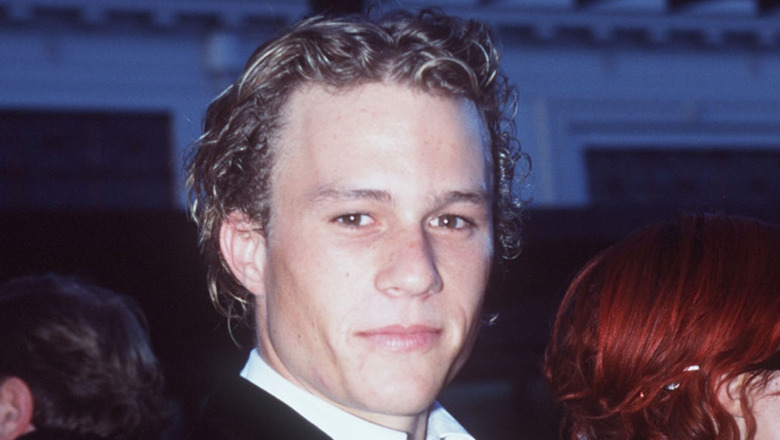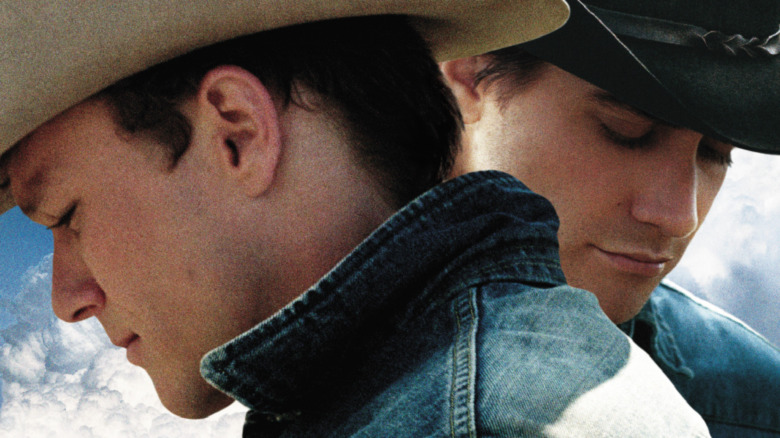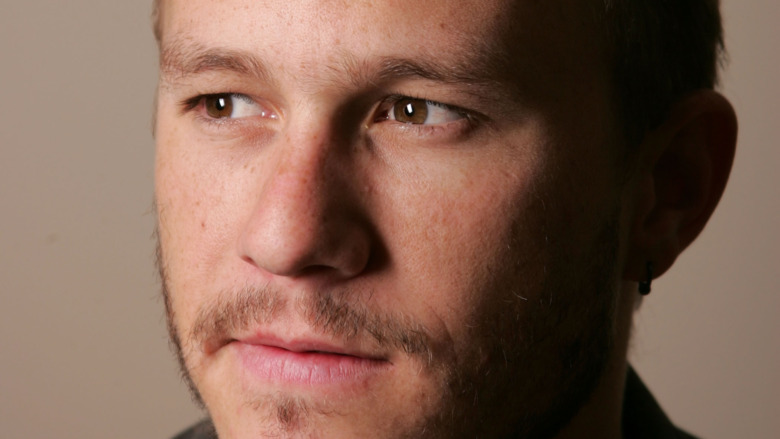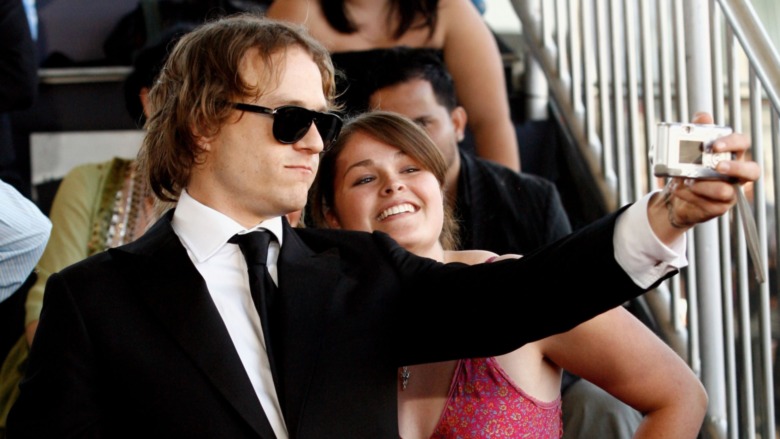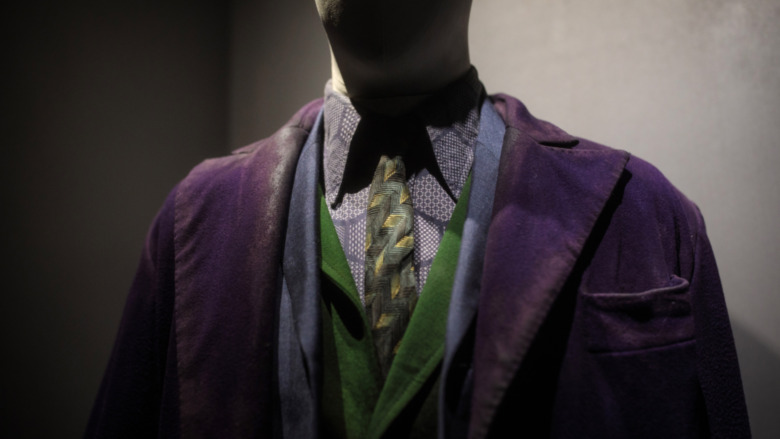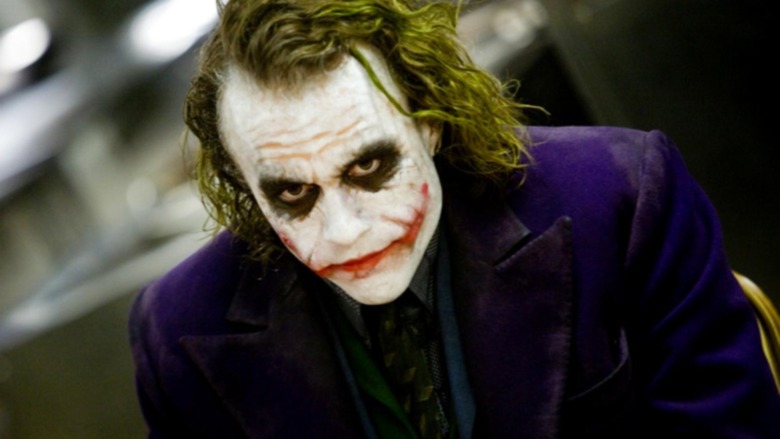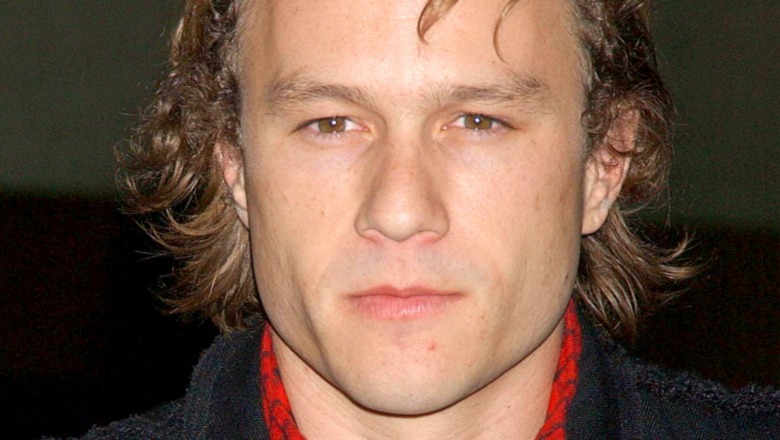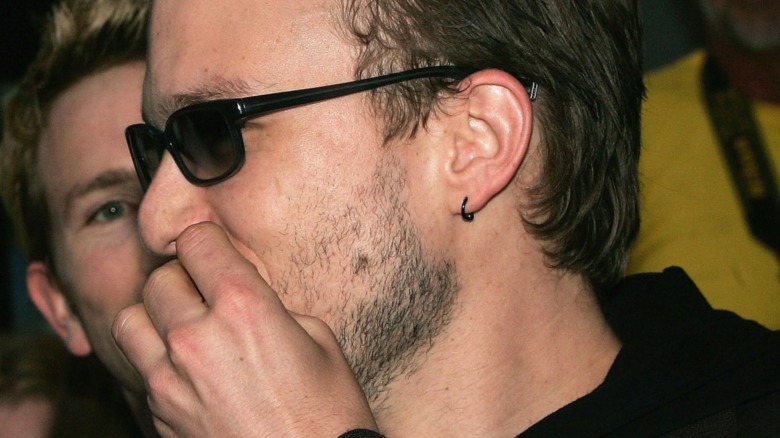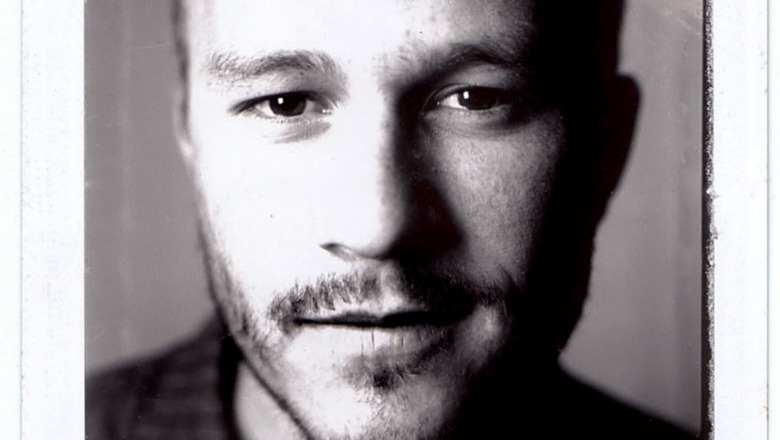The Tragic Real-Life Story Of Heath Ledger
We all know the story. Heath Ledger was the golden-haired, soft-spoken Australian heartthrob who starred in late '90s/early aughts hits like "Ten Things I Hate About You" and "A Knight's Tale." Then he moved onto more serious roles, like his Academy Award-nominated performance in "Brokeback Mountain," a breakthrough moment for LGBTQ+ representation in cinema, and his Oscar-winning performance as the Joker in Christopher Nolan's sequel to "Batman Begins," 2008's "The Dark Knight." But by the time that and 2009's "The Imaginarium of Doctor Parnassus" were released, Ledger had already passed away of an accidental overdose, leaving behind his girlfriend — fellow actor Michelle Williams — and their young daughter Matilda. The tragedy of Ledger's shockingly untimely death has led to endless rumors and speculation over the years about depression, hard partying, and madness brought on by his portrayal of Gotham's Clown Prince of Crime in "The Dark Knight."
But the real story of Heath Ledger's life is far more human than those sordid stories could ever suggest. From his parents' divorce to his breakthrough as a talent to watch, his legendary turns in some of the mid to late aught's most acclaimed movies, and his depression, crippling insomnia, and resulting dependency on drugs, this is the tragic real-life story of Heath Ledger.
Heath's parents split when he was 10
Far too many kids know the lasting pain of growing up in a broken home, and Heath Ledger is no exception. He was 10 when his parents split, back when they were all living in Perth, Australia (which Heath later referred to as "the most isolated city in the world"). His mother, French teacher Sally Ramshaw, and his father, Kim Ledger, who raced and fixed cars, had become one of those couples in name only: sharing some passionless small talk at the table, but going their separate ways after supper to pursue actual passions or whatever else they spent their time with.
"I'm sure there was, like, one week where they didn't speak to each other," Ledger told Rolling Stone in 2006. And yet, the divorce, finalized a year after the split, gave Heath the first taste of the semi-nomadic, always-on-the-move life he'd later live. "I enjoyed being at one house for three weeks, then going, 'OK, right, I'm off,"' he recalled. "It set me up for this bohemian life I've been leading — I feel like I've been traveling with the same bag since I was eleven."
Brokeback Mountain caused predictable but ridiculous outrage
Many young actors struggle to break out of being typecast in teen-oriented dramas and romcoms, and Heath Ledger faced this problem early in his career after breaking through with hits like "Ten Things I Hate About You." Like countless stars before him, Ledger just needed one serious role to demand that he be taken seriously — and he landed it with "Brokeback Mountain." The critically lauded film, about two cowboys who get involved in a complex romantic relationship, was a breakthrough moment for queer representation in the arts. It's also become shorthand for that very same thing, and not always for good reasons. You can see where this is going, assuming you weren't paying attention when the film was released in 2005.
Radio host Michael Medved praised the film's quality but accused it of pushing "the gay agenda." Other pundits like Bill O'Reilly, John Gibson, and Carl Thomas shared similar sentiments, accusing Hollywood of trying to indoctrinate audiences. Late radio DJ Rush Limbaugh had a whole bunch of loudly misguided and ignorant things to say about the film. You get the idea.
There was also the international blowback. Chinese theaters largely ignored the film, while some members of the press and audiences snickered at its taboo nature. Director Ang Lee's Tawainese heritage was also a subject for controversy and censorship there. In the Middle East, only Lebanon showed the film in theaters, albeit in a censored cut. Other Muslim majority nations banned it outright or only permitted it to be rented.
Ledger had a rough relationship with the press
Heath Ledger and the press developed a fairly rocky relationship around the time "Brokeback Mountain" was in theaters. A number of publications depicted him as petulant, aggressive, and rude, even going so far as to spread a story that he or a member of his entourage spat at a journalist in 2004. Ledger himself, despite trying everything that was reasonably in his power to repair his standing with the press in the lead up to the Academy Awards for "Brokeback," was upset at this characterization.
"It's disgusting and awful," he complained in an interview. "I would never in a million years do anything like that. I'm not some sort of dirty spitter." He went on to say, "It's really upsetting. It's blown up now so that I look like I have this gang of friends that all spit at people. I'm not like that. I wouldn't do that in a million years. It just hurts, you know."
His girlfriend, Michelle Williams, came to his defense during this period, saying, "They've been really tough on Heath, and he takes it personally. They've been tossing out this stuff about him being a spitter, and it's just so mean, and it really hurts his feelings. He's not that way at all. It's not true. The only spitter in our house is [baby daughter] Matilda."
Ledger had severe insomnia
According to "I Am Heath Ledger," Adrian Buitenhuis and Derik Murray's 2017 documentary about the late actor, Ledger had a restless, sometimes manic energy that could be a blessing ... and, when it impacted his ability to sleep, also a debilitating curse.
Explaining this part of Ledger's life during a press tour for the documentary, Murray told reporters that Ledger would "sleep either zero or two hours a night for years" and that during these stretches, "he would call people up in the middle of the night."
Ledger would often frequent New York's Washington Square Park at the crack of dawn, mingling with locals there and even sitting down for a game of chess with a stranger. Tony Rivera, a local who ran into Ledger from time to time, told People in 2007, "He would walk early in the morning — around 6:30 a.m. or 7, because, he said, he always had trouble sleeping. That's why he'd come out so early in the morning."
Ledger himself commented on this, too, telling the New York Times in 2007, "Last week I probably slept an average of two hours a night. I couldn't stop thinking. My body was exhausted and my mind was still going." Ledger continued to say that taking one pill had no effect on him. He'd have to take second to fall asleep, only to awake an hour later with his "mind still racing."
Ledger was a notorious partier
A friend of Heath Ledger's told People that the actor, who at the time they spoke was gearing up to play the Joker in 2008's "The Dark Knight," would often drink and socialize into the early hours of the morning.
"He partied a lot. He didn't really stop partying," alleged the unnamed person. "At nights when I was going home, he was just starting. He was part of the New York scene."
As Ledger's friend noted, he could also be seen frequently at clubs, bars, and lounges across New York City, where he was living at the time. Club regulars in Manhattan reported seeing Ledger arrive at the Beatrice Inn after 3 a.m. and leave around sunrise, when most folks were just waking up.
This would seem to present a bit of a chicken and egg situation where Ledger's health is concerned — it isn't clear whether his hard partying habits contributed to his unrelenting insomnia or the other way around — or if there was some kind of symbiotic relationship between the two. Either way, according to numerous individuals, Heath Ledger was a restless soul. Literally.
Ledger's casting as the Joker was met with plenty of scorn
2005 saw the release of "Batman Begins," which further legitimized superhero movies as respectable cinema by taking the story of the title character seriously. Christopher Nolan's talented direction and singular artistic vision helped quite a bit too. But Nolan — who broke into the mainstream with the indie noir "Memento" — was still an up and comer by the time the sequel to "Batman Begins," 2008's "The Dark Knight," came around. A growing number of critics and fans were impressed by his filmography up to that point, which also included the cop drama "Insomnia" and 2006's "The Prestige," a twisty thriller about competing magicians. But he wasn't quite a household name just yet. It wasn't until after "The Dark Knight" came out that Nolan truly cemented himself as a director whose work was worth seeking out regardless of storyline or genre.
Before the movie came out, there were plenty of Batman fans who had plenty to say — and laugh and rage — about when it was announced that Heath Ledger had been officially cast as the Joker for "The Dark Knight." The guy from "Brokeback Mountain" and all those teen-driven romcoms? Please. On paper, it did seem like a puzzling decision, and internet comment sections can be nothing if not vicious whenever they sniff out anything they don't like or trust. But of course, we all know how that turned out: Ledger's performance was one for the ages, giving fans the Joker performance that all others have been compared to ever since.
Playing the Joker took a toll on him
The high quality of "The Dark Knight" independent of Ledger's performance as the Joker — and his shocking death a few months before it was released — have elevated his part in the movie to a near mythical status. But the character wasn't as fun to play as it was to watch. Ledger told the New York Times in 2007, a year before the film's release, that it was physically and mentally taxing to play the Joker, who he described as a "psychopathic, mass-murdering, schizophrenic clown with zero empathy."
To prepare for the film, Ledger locked himself in a hotel room for weeks, working on potential voices and quirks for his character and making delightfully unnerving contributions to the now legendary "Joker diary" he kept behind the scenes.
As we know now, preparing for the role undoubtedly took a toll on Heath. But when he died, rumors swirled that his work on the film so damaged Ledger that it was ultimately the cause of his demise. It would add another tragic layer to his passing if it were true, but as his older sister later told Entertainment Weekly, Ledger "was having fun. He wasn't depressed about the Joker."
He might've suffered from walking pneumonia in his final months
"The Dark Knight" might be Ledger's most acclaimed role, and it's certainly the one made him a legend, but contrary to popular belief, it wasn't his final performance. That sad honor goes to "The Imaginarium of Doctor Parnassus," in which Ledger starred as a magician who took audience members into a mystical place to explore their deepest secrets. (After he died during filming, other actors, like Johnny Depp and Colin Ferrell, portrayed a transformed version of his character in the magical realm).
While he was making the film, Ledger's health problems, already exacerbated by severe insomnia, reached a troubling low. Several members of the cast and crew on the set of "Imaginarium" described him as having symptoms consistent with a potentially dangerous illness.
"Heath did have a terrible, lingering bug in London," said Christopher Plummer, Ledger's then-78-year-old co-star. "And he couldn't sleep at all. We all — I thought he'd probably got walking pneumonia, which they seem to think he had."
Plummer went on to say he believed Ledger picked up the illness while filming in London, due to the unrelentingly cold, damp weather.
"The last few days we were shooting outside a pub. Always outside. Cold as bejesus," he added. "You know how damp it gets in London."
He experienced depression
The final months of Heath Ledger's life often found the acclaimed actor in pursuit of desperately needed, but frequently elusive, rest. Gerry Grennell, a friend of Ledger's who roomed with him towards the end, told People shortly after Ledger's death, "I would hear him wandering around the apartment and I'd get up and say, 'Come on, man, get back to bed, you have to work tomorrow. He said, 'I can't sleep, man.'"
Among other things, Ledger simply had too much on his mind at the time. Grennell went on to say that Heath was anxious, restless, and depressed because he missed his family. "He missed his girl, he missed his family, he missed his little girl — he desperately wanted to see her and hold her and play with her," Grennell recalled, in reference to Michelle Williams and their then-2-year-old daughter Matilda. "He was desperately unhappy, desperately sad."
He developed a dangerous drug habit to deal with his insomnia
Understandably, but dangerously, Heath Ledger eventually developed a sleeping pill habit to help him with his insomnia. And as is often the case, he soon required more than a single dose to get the very limited sleep he was able to obtain using the drugs. The New York Times reported that Ledger would sometimes take two Ambien just to fall asleep even for an hour before waking up, mind racing. When even that stopped having an effect, he began mixing drugs. It wasn't a problem he developed from his partying, as many would assume, but rather desperation: he simply needed sleep and didn't know where else to turn.
After Ledger's death, friend and New York City roommate Gerry Grennell told People that Ledger was aware his habit was harming him. "He said, 'I got to stop, it's not helping, I'm not well, it's making me feel more upset' ... It wasn't helping with the relationship issues, it wasn't helping with missing his kid, it wasn't helping his sleeping — and he knew that."
Ledger's sister Katie also recalled having hard conversations with him over the phone regarding his drug use. "I just said, 'You've got to be very careful mixing things,' and he was like, 'Katie, hello, come on, of course.'"
Sadly, whatever precautions Ledger may have been taking proved not to be enough.
Heath Ledger's tragic death
You know how the story ends. Heath Ledger was found dead in his Manhattan apartment in January 2008. Initially, police reported that they'd found sleeping pills nearby but didn't know what, if any, role they'd played in the actor's demise. Autopsy reports later confirmed that Ledger did indeed die of an overdose. As the official report notes: "Mr. Heath Ledger died as the result of acute intoxication by the combined effects of oxycodone, hydrocodone, diazepam, temazepam, alprazolam, and doxylamine."
Ledger's fans, friends, family members, and peers were devastated, and rumors were inevitable. Some assumed he was just another celebrity who partied too hard and lost control of a drug habit. Others assumed he took his own life. Still others speculated about the damage his portrayal of the Joker had on him, theorizing that it drove him mad by forcing him to look into the abyss. The reality, especially considering he left behind a partner and young daughter, is just as tragic: Ledger's overdose was accidental.
Seeing his incredible performance in the posthumously released "The Dark Knight" that summer, and watching him receive an Oscar for it the following year, added another poignant postscript to Ledger's tragic story. Even today, the shadow of Ledger's death, and thoughts of what might've been, continue to hang over every "Dark Knight" rewatch. But if anything, the lingering pain is a tribute to his immense talent.

